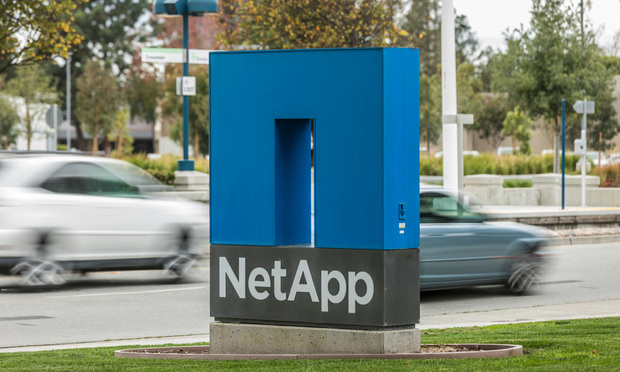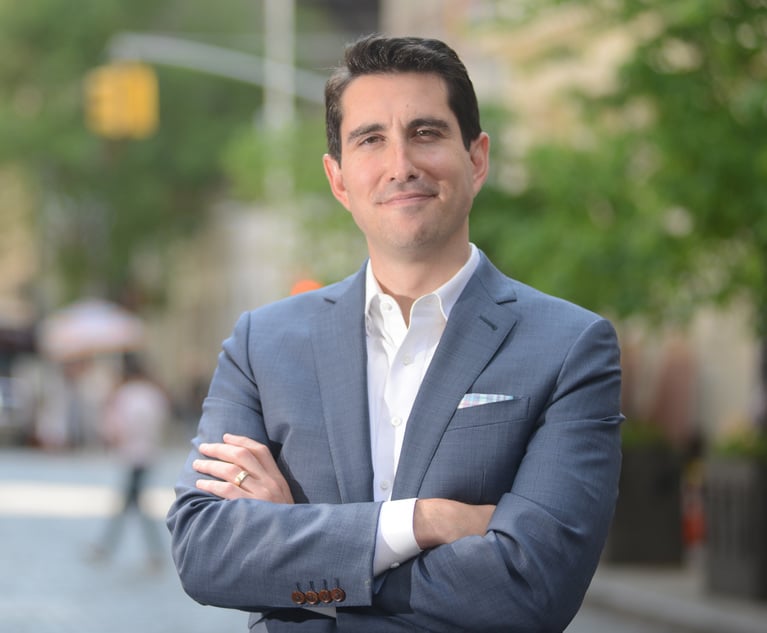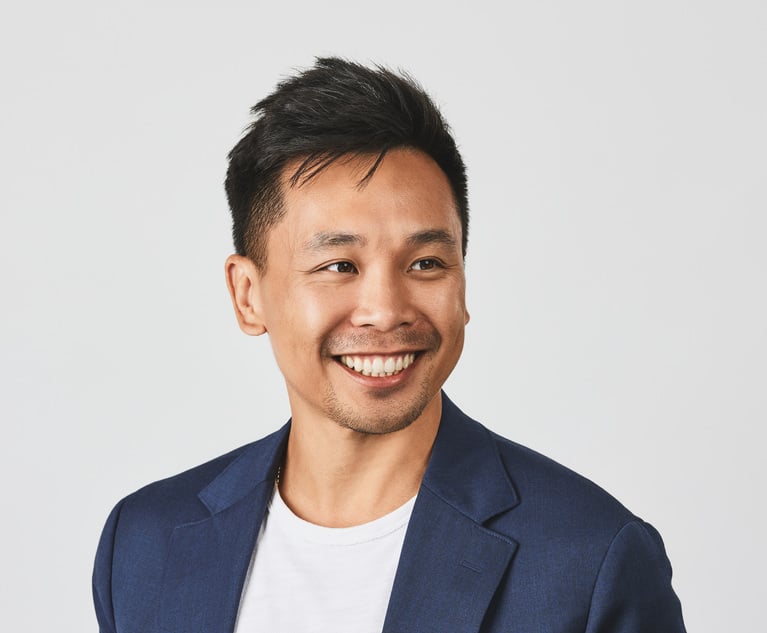Summer Internships in Silicon Valley Offer New Route In-House for Law Students
NetApp, Adobe and Google are among the companies tempting law students with summer programs that just might convince them to opt for the in-house path in their legal careers.
August 07, 2018 at 04:15 PM
5 minute read
 NetApp, one of the companies hosting law students in Silicon Valley. Photo credit: Jason Doiy/The Recorder For most attorneys now in law departments, the road to an in-house role weaved through a few years or more at a firm post-grad. That might not be the case for the next generation of corporate legal leaders. Over the past few years, a number of Silicon Valley legal departments have started or revamped programs aimed to give law students hands-on experience in-house while they're still in school, perhaps tempting them to skip the firm altogether. "The type of work we look at interns to do and the types of careers [available] in-house differ enough from the law firm environment that we thought it made sense to come up with a better way to train students with an interest in the in-house area," said Steve Harmon, vice president and deputy general counsel at Cisco Systems Inc. Harmon is on the leadership team for the Institute for the Future of Law Practice, a collaborative group of representatives from legal departments, firms, law schools and other legal service providers working to improve the quality of education for law students outside the classroom. He said that the chances to get in-house work experience while he was in law school were slim, if they existed at all. But as more legal work moves in-house, he said it's important for students to know about the industry they'll be entering and about other options outside of firms. At Cisco, his legal department has had interns for the past four years from the IFLP program, which places participants in various legal roles. After interns go through a three-week boot camp, they're brought into Cisco for either 10 weeks, for rising 2Ls, or seven months, for rising 3Ls. " The benefit of the seven-months area is that it allows people to take on rotations, so they can practice in different areas and explore where they would ultimately like to take their careers when they graduate," Harmon said. According to Harmon, all of Cisco's seven-month interns have found full-time legal employment on graduation, with some going in-house. Sometimes efforts to pique the interest of law students involve food and booze too. For the past seven years, data storage company NetApp Inc.'s legal department has hosted an event called "BBQ, Beers and Legal Careers." It brings together summer law clerks from a number of Silicon Valley companies, including Cisco and Adobe Systems Inc., as well as law firms, to mingle and explore alternative options. "If I try to reflect back on what we did seven years ago, and why we did it seven years ago, I think clearly we wanted to do two things: we wanted to [introduce] young law students to a variety of careers and we wanted to create some community," said NetApp general counsel Matt Fawcett. NetApp has done that internally through its own summer program, which Fawcett said started after he joined the company in 2010. He said he wanted to create summer clerkship opportunities at NetApp so that law students could see all the options available to them in a changing legal landscape. At many law schools, he said, students are still being trained for a future at a firm, while in reality, new career choices are opening up. The lessons learned at law school for a firm career, he said, don't always align with the skills needed to be a strong in-house lawyer, such as having a strong grasp on business concepts. "I think one of the important things is to make it clear for students, to be transparent about what in-house practice is like, because to me it's not just a different version of working at a law firm," Fawcett said. "It's a different practice entirely." its diversity 1L program, Perkins Coie Arnold & Porter Kaye Scholer. That was a goal shared by Google's legal department, which launched its Legal Summer Institute this year. The four-week program brought law students, full-time 1Ls or part-time 2Ls, from underrepresented groups to Google's headquarters for a week of career training and legal education sessions, providing a peek at in-house life in tech. "What we're really trying to do is introduce more robust pipelines, opening up opportunities and removing barriers to entry for underrepresented students for opportunities across the legal field, whether that's at a tech company or at a law firm," said Aerica Banks, a patent policy analyst at Google who co-founded the institute. Like Adobe, Google's institute participants spent time both in-house and at a firm. After a week spent in mentoring and networking sessions at the tech company's locations throughout the Bay Area, the students spent at least three weeks working at a firm. While students didn't get in-house work experience as part of the program, Banks said they did get an idea of what life at a law department is like, something many may not have seen in the past. "I think for many students this was their first exposure to the in-house experience," Banks said. "Many now see it as an option in their careers."
NetApp, one of the companies hosting law students in Silicon Valley. Photo credit: Jason Doiy/The Recorder For most attorneys now in law departments, the road to an in-house role weaved through a few years or more at a firm post-grad. That might not be the case for the next generation of corporate legal leaders. Over the past few years, a number of Silicon Valley legal departments have started or revamped programs aimed to give law students hands-on experience in-house while they're still in school, perhaps tempting them to skip the firm altogether. "The type of work we look at interns to do and the types of careers [available] in-house differ enough from the law firm environment that we thought it made sense to come up with a better way to train students with an interest in the in-house area," said Steve Harmon, vice president and deputy general counsel at Cisco Systems Inc. Harmon is on the leadership team for the Institute for the Future of Law Practice, a collaborative group of representatives from legal departments, firms, law schools and other legal service providers working to improve the quality of education for law students outside the classroom. He said that the chances to get in-house work experience while he was in law school were slim, if they existed at all. But as more legal work moves in-house, he said it's important for students to know about the industry they'll be entering and about other options outside of firms. At Cisco, his legal department has had interns for the past four years from the IFLP program, which places participants in various legal roles. After interns go through a three-week boot camp, they're brought into Cisco for either 10 weeks, for rising 2Ls, or seven months, for rising 3Ls. " The benefit of the seven-months area is that it allows people to take on rotations, so they can practice in different areas and explore where they would ultimately like to take their careers when they graduate," Harmon said. According to Harmon, all of Cisco's seven-month interns have found full-time legal employment on graduation, with some going in-house. Sometimes efforts to pique the interest of law students involve food and booze too. For the past seven years, data storage company NetApp Inc.'s legal department has hosted an event called "BBQ, Beers and Legal Careers." It brings together summer law clerks from a number of Silicon Valley companies, including Cisco and Adobe Systems Inc., as well as law firms, to mingle and explore alternative options. "If I try to reflect back on what we did seven years ago, and why we did it seven years ago, I think clearly we wanted to do two things: we wanted to [introduce] young law students to a variety of careers and we wanted to create some community," said NetApp general counsel Matt Fawcett. NetApp has done that internally through its own summer program, which Fawcett said started after he joined the company in 2010. He said he wanted to create summer clerkship opportunities at NetApp so that law students could see all the options available to them in a changing legal landscape. At many law schools, he said, students are still being trained for a future at a firm, while in reality, new career choices are opening up. The lessons learned at law school for a firm career, he said, don't always align with the skills needed to be a strong in-house lawyer, such as having a strong grasp on business concepts. "I think one of the important things is to make it clear for students, to be transparent about what in-house practice is like, because to me it's not just a different version of working at a law firm," Fawcett said. "It's a different practice entirely." its diversity 1L program, Perkins Coie Arnold & Porter Kaye Scholer. That was a goal shared by Google's legal department, which launched its Legal Summer Institute this year. The four-week program brought law students, full-time 1Ls or part-time 2Ls, from underrepresented groups to Google's headquarters for a week of career training and legal education sessions, providing a peek at in-house life in tech. "What we're really trying to do is introduce more robust pipelines, opening up opportunities and removing barriers to entry for underrepresented students for opportunities across the legal field, whether that's at a tech company or at a law firm," said Aerica Banks, a patent policy analyst at Google who co-founded the institute. Like Adobe, Google's institute participants spent time both in-house and at a firm. After a week spent in mentoring and networking sessions at the tech company's locations throughout the Bay Area, the students spent at least three weeks working at a firm. While students didn't get in-house work experience as part of the program, Banks said they did get an idea of what life at a law department is like, something many may not have seen in the past. "I think for many students this was their first exposure to the in-house experience," Banks said. "Many now see it as an option in their careers."This content has been archived. It is available through our partners, LexisNexis® and Bloomberg Law.
To view this content, please continue to their sites.
Not a Lexis Subscriber?
Subscribe Now
Not a Bloomberg Law Subscriber?
Subscribe Now
NOT FOR REPRINT
© 2025 ALM Global, LLC, All Rights Reserved. Request academic re-use from www.copyright.com. All other uses, submit a request to [email protected]. For more information visit Asset & Logo Licensing.
You Might Like
View All
Kraken’s Chief Legal Officer Exits, Eyes Role in Trump Administration
3 minute read

Silicon Legal: Tech Companies Stand Up and Speak Out Against Texas Abortion Law

Trending Stories
Who Got The Work
J. Brugh Lower of Gibbons has entered an appearance for industrial equipment supplier Devco Corporation in a pending trademark infringement lawsuit. The suit, accusing the defendant of selling knock-off Graco products, was filed Dec. 18 in New Jersey District Court by Rivkin Radler on behalf of Graco Inc. and Graco Minnesota. The case, assigned to U.S. District Judge Zahid N. Quraishi, is 3:24-cv-11294, Graco Inc. et al v. Devco Corporation.
Who Got The Work
Rebecca Maller-Stein and Kent A. Yalowitz of Arnold & Porter Kaye Scholer have entered their appearances for Hanaco Venture Capital and its executives, Lior Prosor and David Frankel, in a pending securities lawsuit. The action, filed on Dec. 24 in New York Southern District Court by Zell, Aron & Co. on behalf of Goldeneye Advisors, accuses the defendants of negligently and fraudulently managing the plaintiff's $1 million investment. The case, assigned to U.S. District Judge Vernon S. Broderick, is 1:24-cv-09918, Goldeneye Advisors, LLC v. Hanaco Venture Capital, Ltd. et al.
Who Got The Work
Attorneys from A&O Shearman has stepped in as defense counsel for Toronto-Dominion Bank and other defendants in a pending securities class action. The suit, filed Dec. 11 in New York Southern District Court by Bleichmar Fonti & Auld, accuses the defendants of concealing the bank's 'pervasive' deficiencies in regards to its compliance with the Bank Secrecy Act and the quality of its anti-money laundering controls. The case, assigned to U.S. District Judge Arun Subramanian, is 1:24-cv-09445, Gonzalez v. The Toronto-Dominion Bank et al.
Who Got The Work
Crown Castle International, a Pennsylvania company providing shared communications infrastructure, has turned to Luke D. Wolf of Gordon Rees Scully Mansukhani to fend off a pending breach-of-contract lawsuit. The court action, filed Nov. 25 in Michigan Eastern District Court by Hooper Hathaway PC on behalf of The Town Residences LLC, accuses Crown Castle of failing to transfer approximately $30,000 in utility payments from T-Mobile in breach of a roof-top lease and assignment agreement. The case, assigned to U.S. District Judge Susan K. Declercq, is 2:24-cv-13131, The Town Residences LLC v. T-Mobile US, Inc. et al.
Who Got The Work
Wilfred P. Coronato and Daniel M. Schwartz of McCarter & English have stepped in as defense counsel to Electrolux Home Products Inc. in a pending product liability lawsuit. The court action, filed Nov. 26 in New York Eastern District Court by Poulos Lopiccolo PC and Nagel Rice LLP on behalf of David Stern, alleges that the defendant's refrigerators’ drawers and shelving repeatedly break and fall apart within months after purchase. The case, assigned to U.S. District Judge Joan M. Azrack, is 2:24-cv-08204, Stern v. Electrolux Home Products, Inc.
Featured Firms
Law Offices of Gary Martin Hays & Associates, P.C.
(470) 294-1674
Law Offices of Mark E. Salomone
(857) 444-6468
Smith & Hassler
(713) 739-1250






